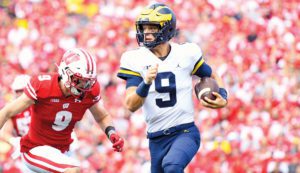Michigan’s home-stretch failure in 2019 and complete flameout in Covid-riddled 2020 led most observers to view the 2021 football team with a jaundiced eye. In Brian Cook’s Hail to the Victors, writers’ win-loss predictions fell between 6–6 and 8–4.
Yet Michigan entered November’s home game against OSU with a 10–1 record. And on a cold and snowy day, its offense was too fast, too clever, and just plain too strong for the OSU defense. For the first time in eight years, the Wolverines beat the Buckeyes, 42–27.

Soph J.J. McCarthy is remarkably fast and can run the ball as well as throw it. | Photo: Bryan Fuller
Before last season, Harbaugh and AD Warde Manuel had reworked his contract, cutting his pay by about 50 percent, to $4 million a year, plus potentially $2 million in bonuses for beating OSU, winning the Big Ten Championship, and making the NCAA playoffs. Harbaugh earned them all—and told Manuel to give the money to department staffers who’d taken pay cuts during the pandemic.
Coming off the most successful U-M football season in twenty-five years, Harbaugh then flirted with returning to the NFL. In January, Bruce Feldman at the Athletic reported that “sources close to Harbaugh” said he would take the Las Vegas Raiders job if offered. Ten days later, ESPN’s Jeremy Fowler wrote that Harbaugh was in the running to lead the Minnesota Vikings. But a meeting in Minneapolis yielded no deal.
Harbaugh returned to Ann Arbor and inked a five-year contract at $7.05 million per year. But the coaching instability was far from over.
Offensive coordinator Josh Gattis took a lateral move to Miami (Florida), reportedly for a nice pay increase. A win for him, but a definite loss for Michigan. Defensive coordinator Mike McDonald, who’d been more or less on loan from John Harbaugh’s Baltimore Ravens, took the DC job there. Recruiting coordinator Courtney Morgan went to the Washington Huskies (at triple the salary), and defensive line coach Shaun Nua left for the same job at USC.

At quarterback, Cade McNamara is a game manager who rarely makes a bad mistake: last year, he completed 64 percent of his passes with just six interceptions. | Photo: Bryan Fuller
Sherrone Moore, a rising star, was a co-offensive coordinator with Gattis last year and retains that title this season. Harbaugh grabbed another young former Ravens assistant, Jesse Minter, to run the defense. Michigan has a sophisticated staff, and on the field, this turnover may not be a big deal. But recruiting relationships do not happen overnight, and kids prefer to come into a stable environment.
Teams recruiting against U-M have to be pointing to Harbaugh’s NFL dalliance and shifting staff to suggest to parents that their kid is walking into chaos. At this writing, Michigan is ranked
twenty-seventh in recruiting for 2023, with OSU fourth.
But this year, at least, Michigan should have another excellent team. The offensive line is largely intact, with the talented Olusegun Oluwatimi replacing Andrew Vastardis at center and Trente Jones leading several other candidates to succeed Andrew Stueber at right tackle. Michigan is loaded at wide receiver and tight end, and the running back tandem of Blake Corum and Donovan Edwards is as good as any in the country. The one great loss is back Hassan Haskins, now in the NFL.
At quarterback, Cade McNamara is as good as anyone in the conference, with the exception of OSU’s C.J. Stroud. McNamara is a game manager who rarely makes a bad mistake; last year, he completed 64 percent of his passes and suffered just six interceptions. But he is pressed by soph J.J. McCarthy, who is remarkably fast and can run the ball as well as throw it. It is probable that both will play early, and the rotation will sort itself out.
On defense, Michigan loses seven starters, including end Aidan Hutchinson (the second overall pick in the NFL draft), plus first-round talents Dax Hill and David Ojabo. While the interior defensive line has plenty of depth and a couple of potential stars, there is no way Michigan will generate the sort of pass rush off the edges as they did last year.
The schedule is favorable. The nonconference games are tepid, and games against MSU, Nebraska, and PSU are in Ann Arbor. Wisconsin has rotated off the schedule, replaced by the less challenging Illinois.
Iowa on the road is a tough test, but heading into Ohio State (in Columbus) Michigan should have, at most, one loss on their record—and another chance to make the playoffs.

